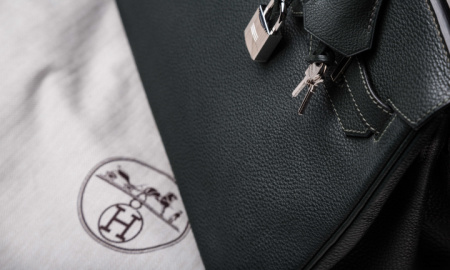Sign up for our free daily newsletter
YOUR PRIVACY - PLEASE READ CAREFULLY DATA PROTECTION STATEMENT
Below we explain how we will communicate with you. We set out how we use your data in our Privacy Policy.
Global City Media, and its associated brands will use the lawful basis of legitimate interests to use
the
contact details you have supplied to contact you regarding our publications, events, training,
reader
research, and other relevant information. We will always give you the option to opt out of our
marketing.
By clicking submit, you confirm that you understand and accept the Terms & Conditions and Privacy Policy
With the popularisation and growth of the metaverse and, of course, the proliferation of non-fungible tokens (NFTs), the world of luxury goods is expanding into digital spaces. Versace, Tommy Hilfiger and McDonald’s are some of the brands that are already securing their trademarks for NFT-authenticated virtual goods, seizing the opportunities of the virtual world. Additionally, these brands are also exploring new branding opportunities in the metaverse, as demonstrated by Gucci’s opening of Gucci Town – a virtual space on Roblox, with a consumer base of more than 200 million.
NFTs’ growth raises a common question: how do they intersect with intellectual property rights, especially trademark protection? This article provides some pointers on navigating the tricky terrain of protection of trademarks by examining some of the guidelines emerging from the trademark offices of the US, Europe and the UK.
Hermès v. Rothschild: a landmark ruling for trademark infringement in the NFT space
In April, luxury brand Hermès International SA sued NFT creator Mason Rothschild for trademark infringement over ‘MetaBirkin’ NFTs that featured Hermès Birkin-branded bags. Rothschild claimed they were transformative works protected under the First Amendment of the US constitution that protects free speech. However, the jury disagreed, finding that the NFTs were a commercial exploitation of Hermès' brand. Rothschild was ordered to pay Hermès $133,000 in damages. This landmark case sets a precedent for luxury brands protecting their trademarks in the digital space, while also reminding NFT creators of the potential legal consequences of incorporating established brands or any trademark in their work. Further, the decision provides clarity for brand owners and outlines factors they can consider when dealing with trademark misuse. However, considering the fast-evolving nature of this space, much would depend on each case at hand.
Brands that were early movers
Several big brands such as Ralph Lauren, Louis Vuitton, Hugo Boss, Versace, Tommy Hilfiger, McDonald’s, NYSE, CryptoPunks, Opensea and Mastercard have already made the move to protect their trademarks for virtual goods authenticated by NFTs. According to data from the US Patent and Trademark Office (USPTO) and the European Union Intellectual Property Office (EUIPO), the leading players in this space to file applications are the fashion industry, digital media and the entertainment industry. Over 23,000 trademark applications globally include NFT in their descriptions, with 37% of applications filed before the USPTO and 9% applications filed with the EUIPO. Interestingly, the Intellectual Property Office of the United Kingdom (UKIPO) has granted the most registrations for these applications over the past year. The WIPO Global brand database indicates around 55 registered applications for the term ‘downloadable virtual goods’.
Making the perfect NFT trademark application
As the popularity of NFTs and virtual goods continues to grow, it is important for trademark applicants to carefully consider their wordings and descriptions used to ensure successful registration. This is because the terms ‘virtual goods’ and ‘NFTs’, though becoming increasingly popular, are not by themselves considered acceptable by the USPTO and the EUIPO due to their indefinite and ambiguous nature as descriptions of goods or services. The EUIPO guidelines have indicated that the type of virtual goods or digital items authenticated by NFTs must be specified. The UKIPO has also indicated that it currently accepts the term “downloadable digital files authenticated by non-fungible tokens” to describe goods in class 9, though it has not issued any guidelines. The terms used in most of the trademark applications vary from ‘downloadable virtual goods’ to ‘metaverse’.
Branding in the new world
For brands, the metaverse presents new opportunities to tap into untapped markets, create unique revenue streams and build brand awareness with a much younger and newer audience. As more and more consumers explore virtual worlds and purchase NFTs, brands are realising the importance of aligning their branding strategies with the emerging metaverse landscape.
At the Gucci Town hosted on Roblox, users can explore and express their individuality through Gucci's virtual clothing and accessories and connect with like-minded individuals. This has proved to be very lucrative for the brand owners – it sold a digital purse for 350,000 Robux, equivalent to roughly $4,200, whereas the physical version could be bought for $3,500.
Similarly, Nike hosts NIKELAND on Roblox, which offers a lifestyle centered around sports with features such as parks, courts, obstacle courses and running tracks. Players can play mini games, try on iconic Nike Jordan brand and Converse pieces in a digital showroom and even buy digitised Nike gear showcased in the game’s outfit collection to customise their avatar.
Nivea, in a very innovative campaign, entered the metaverse through its NFT Touch Collection, with the story of Clarissa Baldassarri, an artist who experienced a temporary loss of sight that made her discover the value of touch. This aligns with Nivea’s brand values of care, creativity and innovation, engaging their consumers in the process.
The future
With the metaverse poised to grow significantly in the years ahead, it is also essential for brands to extend trademark registration in the metaverse for better management and enforcement of intellectual property rights. By aligning their branding, marketing and sales strategies with the metaverse’s potential, brands can tap into untapped markets, create unique revenue streams and build brand awareness.
A partner with India-based law firm K&S Partners, Sudeshna Banerjee advises clients on all aspects of prosecution and enforcement of trademarks, copyrights and domain names. She can be reached at [email protected].
Email your news and story ideas to: [email protected]











